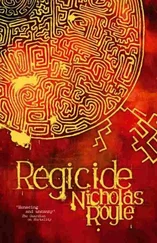Nicholas Royle - Quilt
Здесь есть возможность читать онлайн «Nicholas Royle - Quilt» весь текст электронной книги совершенно бесплатно (целиком полную версию без сокращений). В некоторых случаях можно слушать аудио, скачать через торрент в формате fb2 и присутствует краткое содержание. Год выпуска: 2011, Издательство: Myriad Editions, Жанр: Современная проза, на английском языке. Описание произведения, (предисловие) а так же отзывы посетителей доступны на портале библиотеки ЛибКат.
- Название:Quilt
- Автор:
- Издательство:Myriad Editions
- Жанр:
- Год:2011
- ISBN:нет данных
- Рейтинг книги:4 / 5. Голосов: 1
-
Избранное:Добавить в избранное
- Отзывы:
-
Ваша оценка:
- 80
- 1
- 2
- 3
- 4
- 5
Quilt: краткое содержание, описание и аннотация
Предлагаем к чтению аннотацию, описание, краткое содержание или предисловие (зависит от того, что написал сам автор книги «Quilt»). Если вы не нашли необходимую информацию о книге — напишите в комментариях, мы постараемся отыскать её.
Quilt — читать онлайн бесплатно полную книгу (весь текст) целиком
Ниже представлен текст книги, разбитый по страницам. Система сохранения места последней прочитанной страницы, позволяет с удобством читать онлайн бесплатно книгу «Quilt», без необходимости каждый раз заново искать на чём Вы остановились. Поставьте закладку, и сможете в любой момент перейти на страницу, на которой закончили чтение.
Интервал:
Закладка:
All these words, ravaged from scratch.
You say the ray, concerning this solitary surreal tea-tray, this creature of clairvoyant charactery, and all is lost already. The ray is stationary, as if invisible, a nocturnality. You call it it , and ditto, lost already.
To say the ray is stationary is to invoke the question of singularity, this solitary ray, straightaway. It is a great problem, shield-shaped, you might suppose. Really, it is enough to put the world in disarray. To bring such a creature to account, to arraign it: that’s out with the bathwater in advance, when it comes to the ray. It’s categorically different from man or woman. The woman is this one, a writer, for example, not woman, the man this man, a lawyer, say, not man. ‘The ray’ operates incommensurably. It can be understood generically, as a term for all the rays that ever existed, including the countless millions in deep time, bearing in mind that deep time at once somewhere no one will ever be visiting and, to coin a phrase, the substrate of the present (see above). Or ‘the ray’ can mean just this or that one, singularly. Language wrecks the ray. Revealingly perhaps, the comparison doesn’t hold in the same way in the case of children. The child is closer, in this respect if not in others, to the ray. But the ray is a problem, insuperably so. Or rather, it is an aporia. The ray wrecks language. The revolutionary ray: you reach for words, you riparate. You dream of a new vocabulary, a new reality. Or it dreams you.

What does a man do on the day his father dies? Outside the sun has taken up the baton for another hot summer day. But the relay has stopped. He wonders if he is capable of driving. He thinks at the time he manages it quite well. Later he will receive a speeding ticket, for driving too fast that morning to collect her from the bus station some twenty miles away. He arrives an hour or so early. He parks close to the station and walks around a crowded Saturday morning country town. Like an altercation developing in his peripheral vision he becomes aware that time has slowed down to a catastrophe. Whatever is occurring is occurring with unbelievable, piece-by-piece, falling-apart diffusing diffracting lentissimo decrepitude. No cinema, mental or mainstreet, could capture it, the jostling soundless shopping centre crowds, the lentic swamp, the shattering lens. What he is trying to make out has slowed down to something grinding but imageless, weightless as the noiseless rip of detaching a retina.
And at the same time, in this life-ending slowness, this being a mollusc under someone’s descending shoe, he finds himself walking into a clothes store with a MASSIVE UNBEATABLE SUMMER SALE. Disturbed by his own calmness and foresight, he buys a pair of black trousers and a lightweight black raincoat he can wear to the funeral.
Back at the bus station it is restless, people milling about, dull but strange oppression. He asks does anyone know about the bus from Heathrow. Because it is a Saturday the ticket office is shut. Gradually it emerges that there has been a pile-up on the motorway and the resulting chaos means indefinite delays. He manages to establish that the crash occurred too early for her coach to have been involved. He tries to shrug off the thought that the day is imitating itself. It’s something quite alien, he thinks, to that falseness in the impressions of external things that Ruskin called pathetic fallacy. It’s as if perception itself were a strange mimosa. Everything seems shadowed, shadowing something else.
It should be hallucinational news.
He sees a man, a blind man, standing at the very edge of the pavement, in danger of stumbling off the kerb or being swept into the air by the next passing bus. He is wearing an intolerably hot, shabby brown winter coat and bearing a sandwich board with the announcement:
SCIENTISTS DISCOVER NEW MIMESIS
This waiting at the bus station is an orchestrated revision of what happened in the hospital, in someone else’s mind’s eye. He anticipates, open-mouthed, the reappearance of Mary, even darker-eyed than earlier:
— Sorry about this, she says, this sort of thing happens from time to time. You just have to wait for it to pass. It is the aleatory procession, you can never tell how long it is going to last. And when it is over is when it begins. Just wait and see.
It is as if the people who are waiting in vain, either to collect family or friends or to travel themselves, are in truth, unaware, waiting for test results. The gloom of uncoming buses is repeated in the sky. The brilliant sunshine is inexplicably smacked on the back of the head. Big clouds tumble over, clowns without coherence. The darkness spreads like strong, spilt medicine. Gusts of wind scrap, a chill has crept in. Is this his father’s work? There is nothing eerie about it, everything is simple and matter-of-fact. He goes back to the car park to put more money in the meter and pick up something warmer to wear. In the back of the car he notices the unbeatable knockdown sale-price black trousers and black raincoat he has bought. The sky looks so black it must open.
Back at the bus station news has filtered through that no one has been injured in the accident, and other bus arrivals have been held up by two to three hours.
When she comes it is as usual as if she had beaten him to it, been hiding round the corner and sprung out like the return of the dead that she always will have appeared.
She sees the blank pall of a man undone. He takes her in his arms. She observes his trembling and waits for his speech. He says, already weeping into her shoulder and neck and ear:
— He’s already gone.
It is as if she knew, gathering it thousands of feet in the air, over the night ocean. For some minutes he is fixed, like a piece of paper blown onto her, senselessly secured by the wind. Then he falls back, still speechless. He becomes aware of her baggage, a suitcase and other bags, and wonders how it got there. She tries to take in his stooped, stopped-up form, his strange display of tears in a public place, his frighteningly wiped-out face.
— It was this morning, he says.
On the way home, the sunshine comes back, as if televised, as if the relay were again real, breaking out of a period of implausible interference. Passing through a quiet village, she points out the pretty church and he suggests they stop and have a look. The path up from the lychgate is shady and they pause in the cool of the porch. Her eyes run over the pinned-up notices, her own language but foreign: flower-arranging, organ practice, an announcement for the village fete already two weeks ago. Everything is destroyed. She knows he wants to kiss in the porch, always yes, kiss, the portal, find her lips in the cool shade of the threshold before entering and she lets him, she has him touch her mouth with his fingers, stroke her beautiful face, longing to throw herself into the mirror of his grief while herself already effaced, happy, yes, that she will have been just a character in a book, unrecognisably old and worn away. Nothing of her will get through, not a name, not the faintest vestige of a gesture. She insists on the truth, therefore nothing more can be said. But of course now more than ever with his father dead, she cannot give him up, she cannot leave him. He holds her in his arms in the cool of the porch and runs his fingers through her hair, eyes bulging in stupefied speechlessness gazing into hers, as if she is going to let him be who he had imagined himself being before any of this happened. She lets him kiss her, on the cheeks and lips, she lets her lips be affronted, comforted by the thought that for him she is just a character, she has made that abundantly obvious, and will never be the subject of anyone’s attention and all their love-making, so wild and singular and untranslatable, will pass unrecorded.
Читать дальшеИнтервал:
Закладка:
Похожие книги на «Quilt»
Представляем Вашему вниманию похожие книги на «Quilt» списком для выбора. Мы отобрали схожую по названию и смыслу литературу в надежде предоставить читателям больше вариантов отыскать новые, интересные, ещё непрочитанные произведения.
Обсуждение, отзывы о книге «Quilt» и просто собственные мнения читателей. Оставьте ваши комментарии, напишите, что Вы думаете о произведении, его смысле или главных героях. Укажите что конкретно понравилось, а что нет, и почему Вы так считаете.












